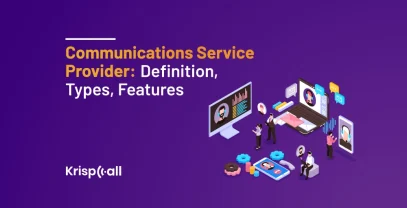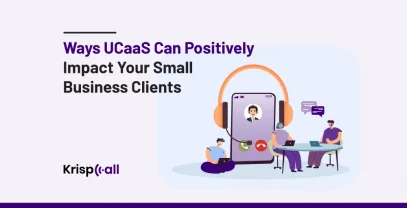Are you feeling overwhelmed😳 by the complexity of choosing a UCaaS provider?
Well, picking a UCaaS (Unified Communications as a Service) provider can be a bit overwhelming with all the choices out there in the market.
But don’t worry! With some careful thought about what your business really needs, you can find🔎 the right fit that aligns perfectly with your requirements and objectives.
In this article, we’ll discuss the top 10 essential things you need to consider before selecting a UCaaS provider for your business.
So, without any further ado, let’s get started🚀.
😎KEY HIGHLIGHTS
- UCaaS combines different communication tools into one platform, making it easier for businesses to manage workflows and stay connected.
- When choosing a UCaaS platform, consider your specific needs and compare them against the features offered by various vendors.
- Prioritize security and compliance by choosing a UCaaS provider that follows industry standards and offers features like encryption and multi-factor authentication.
- Understand the cost and pricing structure of your UCaaS solution, including any additional fees and long-term savings.
- The 5 best UCaaS providers are Zoom Phone, RingCentral, 8×8, Microsoft Teams, and Google Voice, each offering unique features and pricing plans to suit your business communication requirements.
What is UCaaS?
UCaaS (Unified Communication as a Service) is a cloud-based unified communication platform that supports six communications functions: Enterprise telephony, Meetings (audio/video/web conferencing), Unified messaging, Instant messaging and presence (personal and team), Mobility, and Communications-enabled business process.
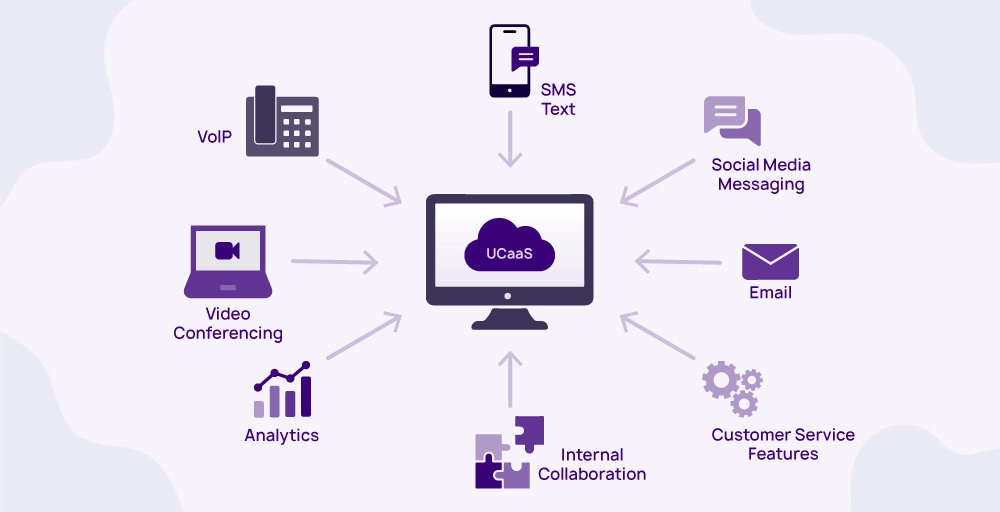
By combining these tools into a single interface, it empowers businesses with greater⏩ control over their workflows and fosters seamless connectivity among employees.
Also, it eliminates the hassle of switching between different communication tools, making the workplace more organized, efficient, and productive.
Now, let’s explore the essential factors to consider when choosing the UCaaS provider that best suits your business needs.
10 Things To Consider Before Choosing the UCaaS Provider for Your Business
1. Feature Set and Customisation
When selecting✅ a UCaaS platform for your company, it’s crucial to assess your specific requirements against the features offered by various vendors.
Typically, UCaaS platforms provide essential features like voice calling, messaging, video conferencing, mobility support, voicemail, and integration capabilities. These features are crucial for smooth communication and collaboration within enterprises.
Also, features like file sharing, screen sharing, call management, analytics, security measures🛡️, and customization options boost productivity. Though advanced features like AI integration, API access, and CRM integration are extras, they can make workflows smoother and improve user satisfaction.
By comparing your company’s needs against what various UCaaS vendors offer out of the box, you can identify the platform that best aligns with your requirements.
2. Quality of Service (QoS)
To make sure you get great🤩 service from your UCaaS provider, check their agreements to see if they promise to keep your system running almost all the time – ideally, 99.999% of the time.
It’s important that switching from old-fashioned phone systems goes smoothly, especially if you want to keep your old phone numbers.
They should offer easy-to-access training for both administrators and users to help everyone learn how to use the new system.
Plus, it’s good to have support available all day and night🕟, with real people ready to help, so any problems can be fixed quickly and your team can keep working smoothly.
3. Scalability and Flexibility
When choosing a UCaaS platform, make sure it can easily grow and change with your company.
This means that if you need to add more users, whether it’s ten, a hundred💯, or even more, the UCaaS provider should be able to handle it smoothly.

Also, if your company starts focusing more on video calls across different devices, the UCaaS platform should be able to do that too.
Many vendors offer products that help with remote work and setting up meetings, giving you the flexibility you need for your communication and collaboration needs now and in the future.
4. Security and Compliance
When picking a UCaaS provider, make sure they prioritize security and compliance.
Check🧐 if they follow industry standards for data encryption, access controls, and compliance. Your communication platform should act like a sturdy shield, protecting against things like unauthorized access or data breaches.
Look for features like multi-factor authentication and encryption to boost security. Make sure the provider is transparent about any past security incidents and how they’ve dealt with them.
By choosing a secure UCaaS provider, you can keep your business communications safe from potential threats.
5. Integration Capabilities
Make sure your UCaaS solution works smoothly with all your current tools and software, including your customer management system and productivity apps.
For example, your sales team should be able to make calls📞 directly from your CRM, and your project managers should start video meetings from their project tools. These connections make communication simpler and help everyone stay focused on their work.
Also, look for features like click-to-call within messaging apps and automatic scheduling of calls and meetings to your calendar. These features save time and effort by reducing manual work.
So, prioritize a UCaaS solution that fits well with your existing software and offers these helpful features to make your team’s work easier and more efficient.
6. Reliability and Support
Reliability and Support in UCaaS solutions refers to the dependability of the service and the assistance provided by the provider.
Reliability is ensured by having a strong💪 infrastructure and redundancy measures. This means that even if one part of the system fails, there are backup systems in place to keep communication running smoothly.
Support refers to the assistance provided by the UCaaS provider in case of any issues or problems. It’s important to choose a provider that offers reliable support, so any issues can be quickly addressed and resolved.
To know if a provider is reliable, check their infrastructure, SLAs, customer reviews📝, compliance, and support availability.
7. User Experience and Interface
For technology to succeed in a company, it’s important that people actually use it and find it easy to use.
When choosing a UCaaS solution, look for one with an interface that’s easy to navigate. Imagine a platform where everyone can quickly understand how to use it and do their tasks without any confusion.

With a user-friendly interface, everyone can quickly understand and utilize the platform’s capabilities, leading to smoother collaboration, file sharing, and meetings.
This makes it simple for employees to embrace the technology and make the most of it, improving communication and collaboration across the organization.
8. Mobile Compatibility
In an era of remote and mobile work, being able to communicate from anywhere is important.
Make sure the UCaaS solution you choose works smoothly on different devices, so your team can stay connected no matter where they are. This means they can easily talk, message, and collaborate whether they’re in the office, at home🏡, or on the move.
Look for a provider that offers mobile apps and works well on smartphones, tablets, and computers.
This way, everyone can stay in touch and work together, no matter their location, boosting productivity and teamwork.
9.Cost and Pricing Structure
When picking a UCaaS solution, make sure you know all the costs involved. Clear pricing💸 helps you budget and see if it’s worth it for your organization.
UCaaS providers offer different plans like bronze, silver, or gold, each with its own features for a monthly fee per license. The more licenses you buy, the cheaper it is per seat.
But watch out for other costs like setup fees, monthly subscriptions, and charges for how much you use. Also, think about the total cost over time, including savings from switching to cloud-based communications and avoiding expensive upgrades.
By considering all these factors, you can choose✔️ the UCaaS solution that’s right for you and your budget without any surprises.
10. Reputation and Testimonials
Reputation and testimonials are like super helpful tools for people trying to pick the right provider from a bunch of options. They tell you if a provider is good or not and what other people thought about their work.
If a provider has a good reputation and positive testimonials, it means you can trust🤝 them to do a good job. It also helps you decide which provider matches what you need because you can see what others liked or didn’t like about them.
Plus, it helps you avoid picking a bad provider because you can learn from other people’s experiences. Providers with good reputations also listen to feedback and try to get even better.
So,remember🧠 to check out reputation and testimonials when choosing a UCaaS provider.They’ll help you find one you can rely on.
By carefully considering these factors, you can confidently select the right UCaaS provider that meets your business needs and sets the stage for effective communication and collaboration.
5 Best UCaaS Providers for Your Business in the Market
Now, after knowing the things you need to consider before choosing the right UCaaS provider, let’s see the 5 best UCaaS providers available in the market.
1. Zoom Phone
Zoom phone is one of the best👍 UCaaS providers because it offers cloud-based phone systems and tools for unified communication. It lets you make calls, host video meetings, send messages, and work together easily on one platform. You can use it on various devices like phones, laptops, and tablets.
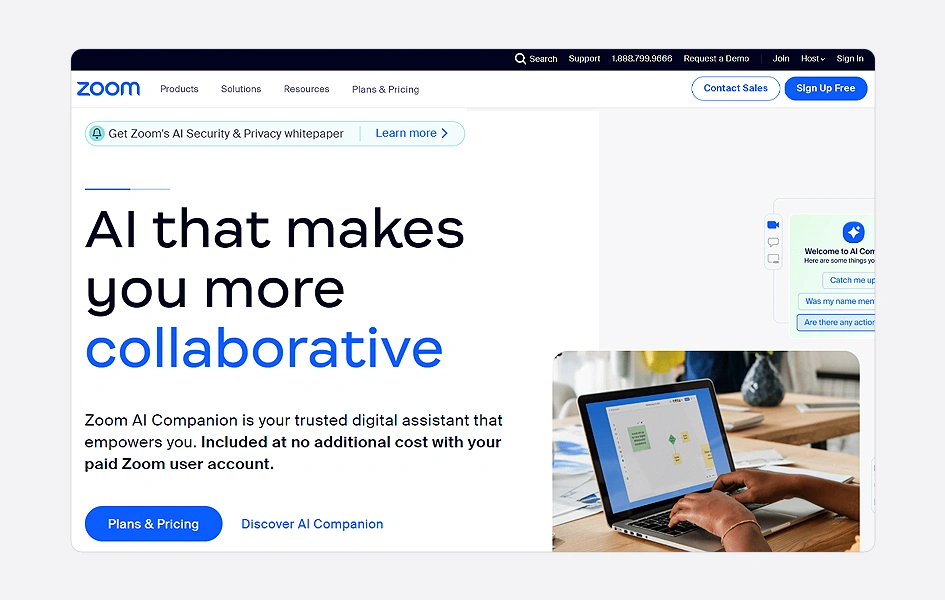
With Zoom Chat, you can do instant messaging, share files, schedule meetings, and more. People love using Zoom Phone because it keeps audio and video quality high, even with lots of users. Plus, Zoom Webinar lets you connect with people worldwide using any device.
⚡Features
- Virtual meetings
- Team chat
- VoIP phone system
- Online Whiteboard
- AI Companion
- Email and Calendar
- Virtual Working spaces
💰Pricing
- Basic: Free
- Pro: $14.99 per/month
- Business:$21.99 per/month
Pros
- The software is easy to use.
- If your connection is good, you will get excellent video and audio quality.
- Up to 100 people can attend free meetings.
Cons
- Require a strong internet connectivity.
- Fewer advanced integrations compared to some competitors.
- No on-premise option.
2. RingCentral
RingCentral offers UCaaS through a cloud-based platform, giving you access to features like video calls, VoIP, and instant messaging on any plan you choose. It’s a great option if you make a lot of calls in the US and Canada.

You can boost productivity with features like text-to-voice messaging. Plus, RingCentral integrates smoothly with apps like Microsoft 365, Google Workspace, and Slack, ensuring you get 24/7 customer support and keeping your customers happy.
⚡Features
- Unlimited online faxing
- Audio conferencing
- Conference Calling
- Integrations with CRM tools
- Call recording
- Call handling
💰Pricing
- Core: $30 per/month
- Advanced: $35per/month
- Ultra: $45 per/month
Pros
- Business SMS
- Toll-free minutes
- Voice mail-to-email
- Advanced analytics
Cons
- Higher price point compared to some competitors
- It can be complex to set up for larger organizations
- Limited CRM integrations
3. 8×8
8×8 provides UCaaS that can adjust to fit the needs of any business, no matter its size. With this service, you can make unlimited international and local calls using toll-free numbers with specific prefixes.

It ensures a smooth experience whether you’re using it on your mobile, desktop, or other devices. This means you can easily find and contact your team members or colleagues across different channels.
Moreover, 8×8’s services are flexible and scalable, supporting business growth. It can integrate with various CRM software, project management tools, and compliance guidelines, making it adaptable to your specific needs.
⚡Features
- Unified communications platform with voice, video, and messaging
- Advanced call center features like ACD and IVR
- Number porting
- Employee status/presence update
- “Meet Now” functionality
- Integrated CRM features
💰Pricing
- Express: $15.00 /user
- X2: $28.00 /user
- X4: $57.00 /user
- X6: $85.00 /user
Pros
- Unlimited calling
- Shortcut to quickly initiating calls
- Video and audio conferencing
- Access to dozens of popular integrations
- Chat rooms and messaging for easy collaboration
- Private and public streaming of meetings
Cons
- Higher learning curve compared to simpler options
- Pricing and setup favor enterprise-level companies rather than small businesses
- Limited free trial/demo options
4. Microsoft Teams
Microsoft Teams lets users collaborate and communicate using voice, video, and other UCaaS tools. It integrates well with other platforms, so you can access Teams’ features alongside other communication tools.
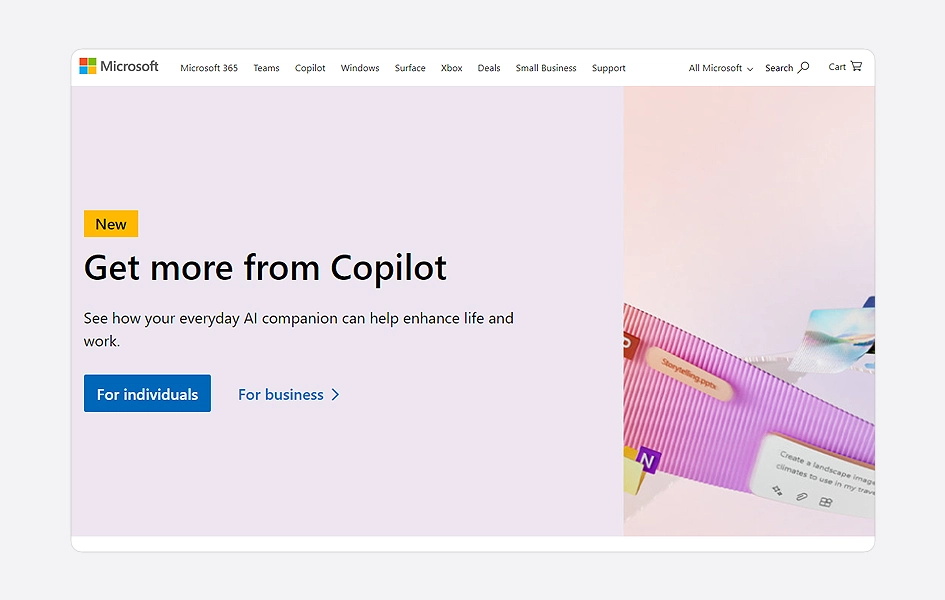
This means you can use all the collaboration tools in one place, making communication smoother. Because of its advanced features, you can easily grow your business and boost productivity.
⚡Features
- Live events
- App integrations
- Audio and video calls
- Meeting and video conferencing
- File sharing and collaborations
💰Pricing
- Microsoft Teams Essentials: $4.00 user/month
- Microsoft 365 Business Basic: $6.00 user/month
- Microsoft 365 Business Standard: $12.50 user/month
Pros
- Microsoft 365 integrations
- Channel-based organizations
- Multi-platform support
Cons
- Live events
- App integrations
- Audio and video calls
- Meeting and video conferencing
- File sharing and collaborations
5. Google Voice
Google Voice is a UCaaS solution that brings together various communications channels.It gives businesses a flexible platform to make communication with teams and customers easier and better. Also, it is a part of Google Workspace.
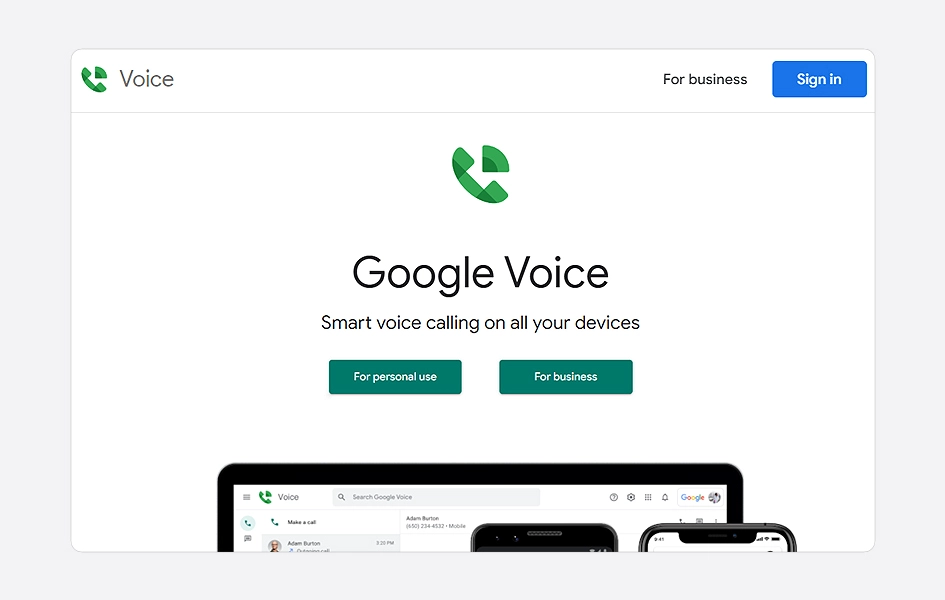
Google Voice works smoothly with other Google tools, making it easier for users to have everything in one place.
⚡Features
- Call routing
- Call forwarding
- Voicemail transcriptions
- Call screening and blocking
- Text messaging
💰Pricing:
- Starter: $6 per/month
- Business Standard: $12 per/month
- Business Plus: $18 per/month
- Enterprise: Contact sales
Pros
- Integration ability
- High-quality communications services
Cons
- Limited features compared to dedicated VoIP providers
- No call queuing or advanced call routing
- Not ideal for business-critical communications
Wrapping Up…
Picking the right👉 UCaaS provider for your business may seem overwhelming, but considering factors like features, quality, scalability, security, integration, user experience, reliability, mobile compatibility, cost, and reputation can guide your decision.
By carefully evaluating these aspects, you’ll find a provider that meets your needs and helps your business thrive. With options like Zoom Phone, RingCentral, 8×8, Microsoft Teams, and Google Voice, you have a range of choices to explore, each offering different features and benefits.
Ultimately, choosing the right UCaaS provider will boost your team’s communication, collaboration, and productivity, leading to greater success🏆 for your business.



